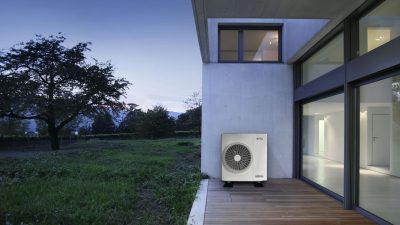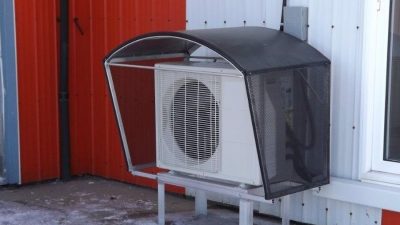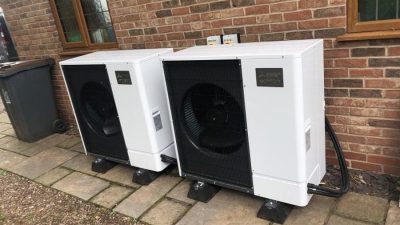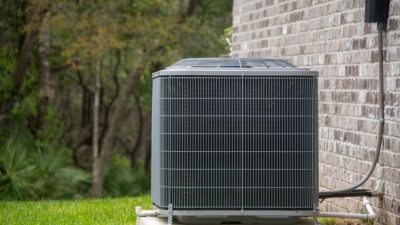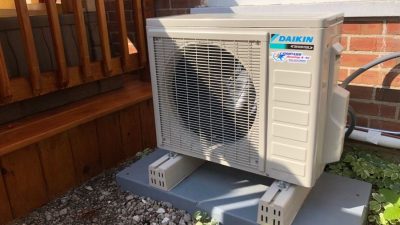Do you want to save money on your energy bills while still staying warm? A heat pump may be the perfect option for you. Heat pumps are becoming an increasingly popular choice for heating and cooling homes, especially in areas with mild winters. But before you take the plunge and install one, it’s important to understand the pros and cons of a heat pump. In this article, we’ll explain what a heat pump is and discuss the advantages and disadvantages of using one in your home.
Heat pumps use electricity to transfer heat from one place to another in order to cool or heat a space. This means that instead of producing their own heat (like a furnace does) they move heat from the outside into the house during winter months, and move it out during summer months. Heat pumps are more efficient than traditional heating systems because they don’t have to generate any new energy – they simply transfer existing energy from one place to another.
While there are many benefits associated with using a heat pump, there are also some drawbacks that should be taken into consideration. By understanding both sides of this equation, homeowners can make an informed decision about whether or not a heat pump is right for them. In this article, we’ll explore all aspects of the pros and cons of a heat pump so that you can decide if this is an investment worth making.
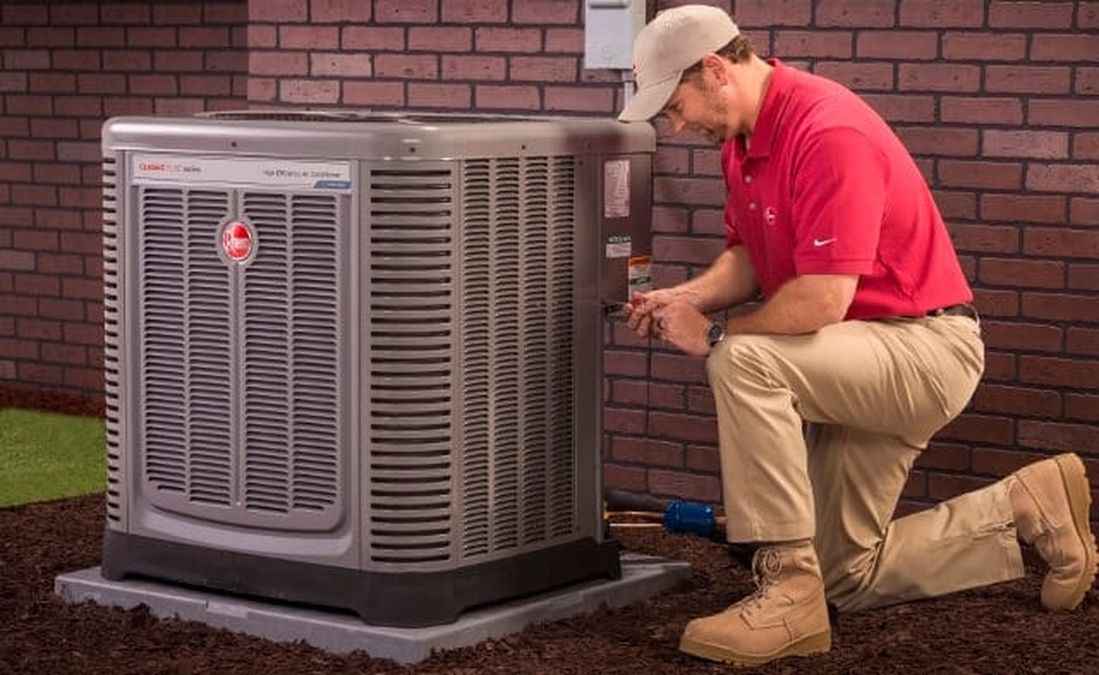
Overview Of Heat Pumps
Heat pumps are systems that use renewable energy sources to provide cooling and heating. They have become increasingly popular in recent years, due to their energy efficiency and the many benefits they offer. Heat pump technology is designed to reduce energy consumption and lower utility bills. It allows homes and businesses to enjoy reliable comfort without relying on traditional air conditioning systems.
Heat pump systems use a refrigerant-based cycle that extracts warm air from the outside environment, condenses it, and then circulates it inside a home or building. This process can be used for both cooling in the summer and heating in the winter, making them versatile and ideal for most climates. They also have a much higher efficiency rating than other traditional heating options, allowing them to save money on utility bills while providing superior comfort.
In addition to their energy efficiency, heat pumps also offer several other benefits. They are durable, low maintenance, eco-friendly, quiet, and require very little space compared to more traditional HVAC systems. Heat pumps can also provide year-round comfort with minimal disruption of indoor temperatures or humidity levels. With all these advantages combined, it’s no surprise that heat pumps have become so widely used across both residential and commercial settings.
Advantages
The advantages of heat pumps are undeniable. They are extremely energy efficient, meaning you can stay warm with minimal energy expenditure. Additionally, they are environment friendly and don’t emit pollutants that harm the atmosphere. Furthermore, they operate quietly so you won’t have to worry about noise pollution. Plus, their low running costs make them a great choice for saving money. Finally, they provide excellent temperature control so you can enjoy a comfortable atmosphere in your home all year round.
Heat pumps offer a myriad of benefits that make them an ideal heating option. From their energy efficiency and environment-friendly operation to their low running costs and excellent temperature control, it is easy to see why these systems are growing in popularity.
Disadvantages
The disadvantages of heat pumps can be hard to ignore. One common issue is the noise they produce; this can be frustrating, especially in a quiet home. Additionally, a heat pump may not provide sufficient cooling for hot climates, where an air conditioner might be more effective. Furthermore, due to their limited efficiency, they’re often too small to properly condition large areas. This leads to inefficient sizing and poor indoor air quality.
Heat pumps are also vulnerable to temperature drops outside. If the temperature falls below freezing point, it won’t be able to provide adequate heating. In this case, you’ll need an additional source of heat such as a furnace or space heater. This could prove costly in terms of energy bills and maintenance costs. Ultimately, these drawbacks may outweigh the potential savings that come with using a heat pump system.
Cost Considerations
When it comes to the cost of a heat pump, the purchase price can be expensive. Installation costs also need to taken into account, as they can be substantial. Nevertheless, in the long run, the running costs of a heat pump are often lower than other heating systems. This is because heat pumps are highly energy efficient and therefore use less energy to operate than other systems.
The benefits of a heat pump in terms of running costs mean that the initial higher purchase and installation prices may be outweighed over time. However, if you live somewhere with milder winters or don’t require regular heating for prolonged periods, then a heat pump may not prove economical for your home.
When assessing whether or not to invest in a heat pump, it’s important to consider both short and long-term costs and decide which system best meets your needs. It may be worth consulting an expert who can advise on the best option for your situation and provide an accurate estimate of any associated costs.
Installation Requirements
Installing a heat pump requires expertise and the right tools. It’s best to hire a licensed HVAC technician who is knowledgeable about all aspects of the installation process.
When it comes to cost, heat pumps can be relatively expensive depending on the model, size, and type you choose. The cost of installation may also vary depending on the complexity of your project. Here’s what you should consider:
- Heat Pump Installation:
- Cost: A professional installer will assess your home and determine the exact cost of the installation before beginning work.
- Setup: A trained technician will have all of the necessary tools, such as wiring and refrigerant lines, to properly install your heat pump system.
- Replacement: If you are replacing an existing unit, an experienced technician will ensure that it is removed safely and properly dispose of any old components.
Heat pump installation instructions are available online for those who want to go DIY; however, this can be time consuming and potentially dangerous if proper safety measures are not taken into account. It’s important to research local laws regarding permits and licensing before attempting a DIY project.
Overall, while there are some potential benefits associated with installing a heat pump yourself, such as saving money and gaining knowledge in the process, it’s still recommended that you hire a professional for your heat pump installation needs. This way, you’ll have peace of mind knowing that your system has been installed correctly and safely according to industry standards.
Maintenance Needs
Now that the installation requirements of a heat pump have been covered, it’s time to discuss its maintenance needs. Proper upkeep of a heat pump is essential in order to keep it running efficiently and effectively. Regular inspections, preventative maintenance and cleaning are all necessary for optimal performance.
If your heat pump is not serviced regularly, its performance can suffer, leading to higher energy bills and the risk of breakdowns. The best way to ensure proper maintenance is by scheduling regular services with a qualified technician. This should include inspecting components such as the compressor, condenser coil and filters for any signs of wear or damage, as well as checking all connections for loose wires or faulty wiring. Additionally, you should also get your technician to clean all air vents and registers to reduce dust build-up which can impact efficiency.
Overall, having a heat pump requires some additional effort from the owner in order to keep it running smoothly and efficiently. By making sure regular servicing is carried out and that the necessary cleaning requirements are met, you’ll be able to enjoy all the benefits that come with having a reliable heat pump system in your home.
Frequently Asked Questions
How Long Does A Heat Pump Typically Last?
When it comes to heat pumps, one of the most important questions is how long they last. Heat pump life expectancy can vary based on a number of factors like size, maintenance, and installation. Generally speaking, a well-maintained heat pump should have a lifespan of around 10-15 years. That said, there are some models that have been known to last up to 20 years with proper care.
Heat pumps are quite durable and require minimal maintenance compared to other HVAC systems. Regular maintenance is key for extending the life of any heat pump as it can help identify potential problems before they become major issues. Additionally, regular maintenance can help reduce energy costs by ensuring your system is running optimally at all times. Investing in quality materials during installation can also increase the longevity of your heat pump as high-quality parts will be better able to withstand wear and tear.
Given their long-term durability and low maintenance requirements, heat pumps offer a great value for homeowners looking for an efficient way to heat or cool their homes. In addition to saving money on energy bills, the cost savings associated with investing in a quality system and proper upkeep make it well worth considering if you’re in the market for an HVAC system.
Is A Heat Pump Suitable For All Climates?
Is a heat pump suitable for all climates? This is an important question to consider when deciding if this type of heating system is right for your home. Heat pumps are becoming increasingly popular due to their energy efficiency, but it’s important to understand how climate compatibility could affect their performance.
The good news is that heat pumps are designed to be compatible with most climates. To ensure optimal performance and efficiency, however, it’s important to select the right type of heat pump for the climate you live in. Here are some key factors to consider:
- Heat Pump Climate Suitability:
- Cold Climates: Cold climates require an outdoor unit specifically designed for use in colder temperatures.
- Mild Climates: In milder climates, a standard unit should do the job just fine.
- Hot Climates: For hot climates, selecting a unit with advanced cooling technology can help improve efficiency and performance.
By understanding the climate suitability of different types of heat pumps, you can make sure you choose the right one for your home. Additionally, you may need to look into additional features such as noise level or ventilation requirements when selecting a heat pump suitable for your climate.
Choosing the right type of heat pump can help ensure that it works effectively and efficiently in all kinds of weather conditions, while also providing maximum comfort in your home. With careful consideration and research into the best options available, you’ll be able to find a perfect fit for your climate and needs.
Are There Any Government Incentives Available For Installing A Heat Pump?
Are there any government incentives available for installing a heat pump? Absolutely! In fact, many governments have established various subsidies, grants and other initiatives to make heat pumps more accessible and cost-effective for homeowners. Heat pump incentives can take the form of cash rebates, tax credits or even low-interest loans.
The availability of these programs depends on the region and local energy providers, so it’s always a good idea to check with your service provider or municipality first. In some cases, the incentives are administered directly by the government while in others they are available through local utilities or energy providers. Depending on where you live, you may be able to access generous savings when you install a heat pump in your home.
Whether it’s a federal or state program, an energy rebate or tax credit initiative – there are many ways that governments are encouraging people to switch to more efficient heating methods like heat pumps. If you’re looking for ways to save money on your energy bills, then investing in a heat pump could be the perfect solution – with help from government-funded grants and subsidies.
How Much Can I Expect To Save On Energy Costs With A Heat Pump?
Are you considering installing a heat pump to cut your energy costs? If so, you may be wondering just how much money you could save with this system. Fortunately, there are many benefits that come with investing in a heat pump, including reduced energy costs and utility savings.
Heat pumps can be an excellent way for homeowners to save money on their energy bills. In fact, the average household can save up to 50% on their heating and cooling costs by switching to a heat pump. By taking advantage of the natural heat exchange process between the air and ground, a heat pump can reduce your energy consumption while providing efficient heating and cooling solutions.
Whether you’re looking to replace an old system or install a new one, it’s important to consider the cost savings associated with investing in a heat pump. With lower energy costs and utility savings, you can enjoy significant financial benefits over time. Additionally, some states offer government incentives for installing these systems, making them even more cost-effective for homeowners.
Investing in a heat pump is an excellent way for homeowners to reduce their energy costs while still enjoying comfortable temperatures in their home year-round. By taking advantage of government incentives and potential cost savings from reduced energy consumption, you can ensure that your new system is both cost-effective and efficient.
What Are The Most Important Features To Look For When Purchasing A Heat Pump?
When purchasing a heat pump, it’s important to consider what features are most important to you. From heat pump efficiency and cost to installation and best heat pumps, there is a lot of information out there to digest. To help make the decision easier, let’s look at some of the features that are essential when selecting a new heat pump.
Heat pump efficiency is one of the main considerations when shopping for a new system. The higher the energy-efficiency rating, the better your chances of reducing energy costs. Make sure to research different models and find one with a high Energy Star rating and low annual operating costs. Heat pump installation is also something to consider as an efficient unit must be installed properly in order for it to work correctly. Opting for a professional installer can help ensure that your system will provide maximum performance over its lifetime.
Cost should also be taken into account when looking for the best heat pump for your needs. While you may want the highest quality model available, remember that more expensive doesn’t always mean better performance or greater savings in the long run. Take time to compare prices and read reviews from other customers before making a final decision on which unit to purchase.
By doing your homework on heat pump features and cost, you can find the perfect system for your home that meets all of your needs while staying within budget. With some careful research and consideration, you’ll be well on your way to finding an efficient and effective heat pump that will save you money in both energy bills and overall cost in no time!
Conclusion
In conclusion, heat pumps are an effective and efficient way to heat your home or business. With its long life span, ability to work in all climates, and potential government incentives, it can be a great choice. To get the most out of it though, make sure that you select one with all the features you need. This includes size, type of energy source, and efficiency rating.
Overall, there are many advantages to having a heat pump installed in your home or business. It can save money on energy costs while providing consistent heating throughout the year. Plus, it is designed to last for many years before needing repairs or replacements.
So if you’re looking for a reliable heating system that won’t break the bank, then a heat pump could be the perfect option for you. Just make sure to research all of your options carefully and look for one that fits your budget and specific needs.

